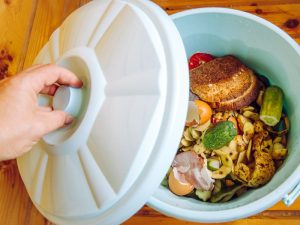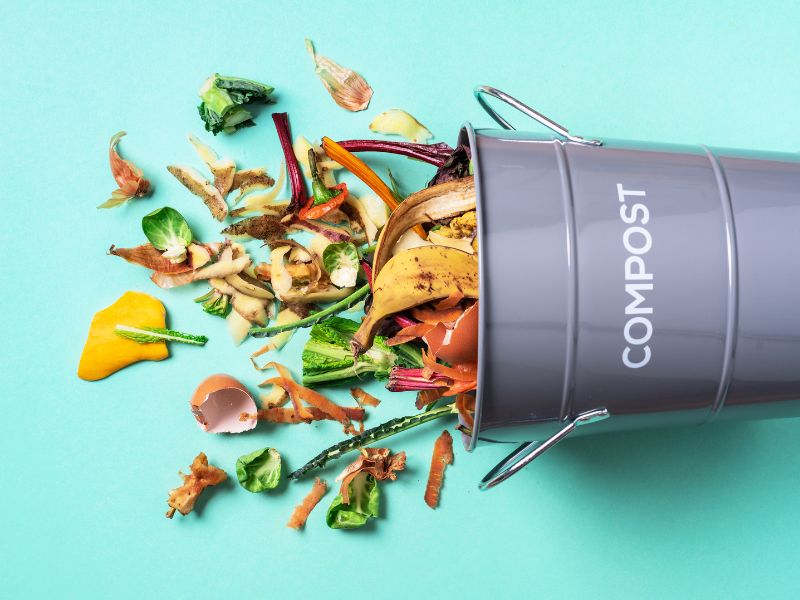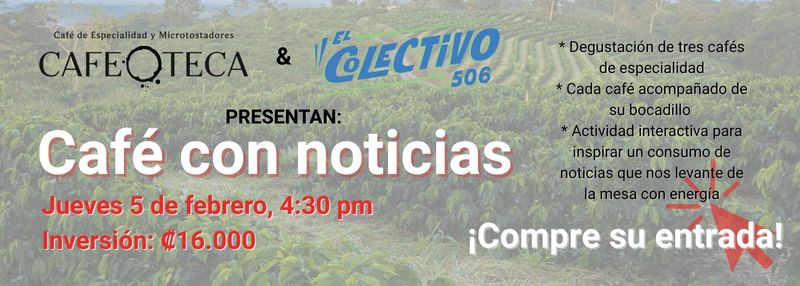What would it take for more people to take up composting in Costa Rica? Where else in the world is this practice being implemented successfully? And does it meet solutions journalism’s REAL test: a response to a problem with evidence of impact; applicable lessons and insights that others can implement; and limitations or caveats we can avoid?
As our reporting throughout this edition, “Recycling closes the circle,” has shown, recycling is an essential part of reducing our production of waste. However, recycling can only achieve so much. Even if Costa Rica achieved 100% recycling of its recoverable materials, our food wastes would still be heading to landfills, producing carbon emissions, and worsening the climate crisis.
Let’s take a look at efforts in other latitudes that are addressing this huge component of the fight to reduce the negative impact of waste.
The problem:
According to a fact sheet from the United Nations Environmental Programme (UNEP) and its Food Waste Index Report 2024, the world wasted 1.05 billion tonnes of food in 2022, which corresponds to 19% of all food available to consumers. Of that waste, households were responsible for 60%. And “food loss and waste generates 8-10 percent of all global greenhouse gas emissions—almost five times the total emissions from the aviation sector.” How does Costa Rica fit into this picture? According to The Global Food Donation Policy Atlas, “while Costa Rica has not published official food loss and waste data, estimates suggest that approximately 40% of the country’s food supply is needlessly lost or wasted each year.” Learn more about food waste in this data story by La Data Cuenta.
A response:
While food waste is a problem for many reasons, composting reduces the negative impact by keeping food waste out of carbon-emitting landfills. Plenty of people are composting in Costa Rica, but to find a nationwide, systematic composting effort, we have to look abroad. An in-depth report by the LA Times in 2023 documented how South Korea has become a world leader in this respect: “Since South Korea banned land-filling food waste in 2005, followed by another ban on dumping its liquid byproduct (known as leachate) into the ocean in 2013, the country has operated a comprehensive composting program that recycles almost all of its discarded food into fertilizer, animal feed or… a type of fuel called biogas.” The only legal way to dispose of food waste is in government-issue yellow bags that cost about $0.70 per liter. Revenue from sales of the bags offsets the cost of the national composting system.
Evidence of impact:
Seoul now recycles 100% of the 2,500 tons of food waste it produces daily—“a remarkable jump from just 2.6% in 1996,” the LA Times reports.
Adopt-able insights:
Rule-breakers were common early on, according to the LA Times story; the government had to implement measures such as incentives for tipsters who reported people who illegally discarded their food waste. A New York Times piece on the program describes how the government improved the program over time to reduce smells, a complaint that in some cases derailed efforts temporarily. Incorporating new technology helped prevent malodorous bins and improved dropoff procedures: “At apartment complexes around the country, residents are issued cards to scan every time they drop food waste into a designated bin. The bin weighs what they’ve dropped in; at the end of the month they get a bill.”
Limitations or caveats to avoid:
The New York Times story says that despite the income from those yellow bags and other consumer fees, “the program costs South Korea about $600 million a year, according to the country’s Ministry of Environment.” And the LA Times piece notes that consumer buy-in was possible because overflowing landfills causing bad smells and pests primed the population for the inconvenience of the new system. Considering the relatively low profile of food waste as a problem in Costa Rica, it’s easy to imagine that new procedures for disposing of food waste could be a tough sell here. Another limitation is similar to one faced by recycling programs: even widespread success doesn’t necessarily reduce overall waste production. “The amount of discarded food nationwide has stayed more or less steady over the years, according to data from the Ministry of Environment,” states the NYT.

Who’s working on composting in Costa Rica and Latin America?
Here, various initiatives are working to make home composting easier—such as Hagamos Composta, which, according to its Instagram page, picks up your filled compost buckets, processes the organic wastes on your behalf, and returns finished compost to you. According to Hagamos Composta’s one-year anniversary post in October 2023, its measurable impact includes keeping 26 tons of organic waste out of landfills in 11 Costa Rican cities and towns. Ecoins, a recycling program and app that sponsored and has been featured in this edition, also has a composting option: consumers whose municipalities have home composting programs can earn points for organic materials they deliver to their local governments. The app was launched in Costa Rica but now serves countries throughout the region. In terms of broader public efforts, Quito, Ecuador, has a city-wide pickup program called Agrovivas.
Who else is leading the charge on composting in our country and region? Do you compost? What questions, insights, and ideas do you have for how this practice might grow? Write to us at [email protected] or via WhatsApp at (+506) 8506-1506. Our “Why Not This?” mini-stories explore practices and initiatives that are achieving impact elsewhere, but have not yet been widely implemented in Costa Rica. As solutions journalists, we hope to provoke and join conversations about the local potential for these practices… and perhaps to generate ideas for future in-depth editions of El Colectivo 506.
Read more from our edition “Recycling closes the circle” here.





